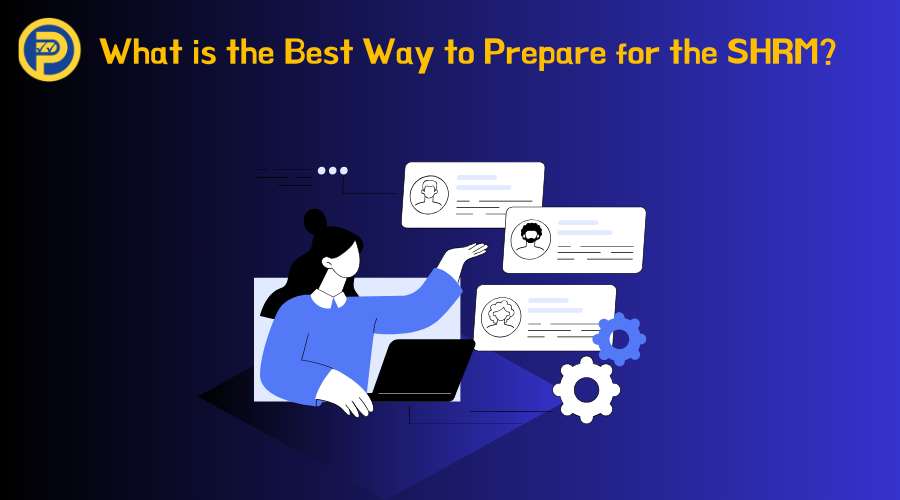Many aspiring HR professionals find themselves pondering the best strategies for preparing for their SHRM exams.
As the Society for Human Resource Management (SHRM) certification has become a hallmark of excellence in the HR field, understanding how to effectively study is crucial for success.
With a wealth of resources available, from official SHRM study materials to online courses and peer study groups, navigating the preparation landscape can be overwhelming.
However, with the right approach and a tailored study plan, candidates can boost their confidence and enhance their knowledge.
In this guide, we will explore proven techniques and practical tips to help you maximize your study time and achieve your certification goals, paving the way for a successful career in human resources.
Learn: How to Register for SHRM
1. Check your Eligibility
Have you checked if you’re eligible to take the exam? If you haven’t yet reviewed SHRM’s eligibility criteria and confirmed that you meet the requirements, head over to the SHRM website now.
If you’re not currently eligible, focus on meeting SHRM’s eligibility standards first, before starting your test preparation. This guide is designed for those who have already confirmed their eligibility to apply for and take the SHRM-CP or SHRM-SCP exam.
2. Get Committed
After confirming your eligibility to take the exam, consider the following two crucial questions:
Do I Have the Time?
Prepare to dedicate at least 80-100+ hours over 12+ weeks to this process. Without this level of commitment, you might find yourself scrambling in the final week before the exam.
Many HR professionals have expressed regret over not spending enough time preparing in the weeks leading up to the test. Cramming simply won’t cut it!
The time commitment can vary depending on your experience, but even if you’re an accomplished HR professional, you need to invest the time.
This might involve reading, answering practice questions, reviewing flashcards, joining a study group, attending classes, and more. A timeline will help guide your efforts.
Is This the Right Time for Me?
This can be a difficult question to answer. Life can be unpredictable, both personally and professionally. Be realistic when assessing whether your current circumstances allow for such a significant commitment.
Make sure you’ve answered these three questions before proceeding. It’s too easy to make excuses when challenges arise.
Don’t give your future self any reason to justify quitting. You need to be confident in saying YES to all two questions to ensure a strong and lasting commitment.
Find out: How Long Does it Take to Get SHRM Certified
3. Develop a Study Plan
After establishing your timeline, the next step is to develop a study plan. Begin by transferring your timeline milestones into your calendar, being precise with the dates and times.
For example, if you decide to dedicate about 6 hours per week, including class time, to prepare for the exam and your class meets on Mondays and Wednesdays from 6 PM to 7:30 PM for 12 weeks, therefore, you should enter all 24 class sessions into your calendar.
Scheduling consistent class times is straightforward, as you know exactly when they start and end. But what comes next?
It’s best to keep your study blocks consistent so you can easily remember them without constantly checking your calendar. The simpler, the better.
The next step is to evenly divide your study materials. Review your materials and estimate how much you need to cover each week. Then, write specific tasks within each study block in your calendar.
For instance, the instructor might suggest reading a section on Leadership & Navigation and completing an associated quiz in the online SHRM Learning System.
If you get any quiz questions wrong, you will be advised to revisit that section to ensure you fully understand the correct rationale.
Remember, creating a study plan is a personal process. It should fit your life, responsibilities, and needs. Flexibility is key, so design a plan that works best for you.
4. Know What to Expect
Being prepared for exam day is crucial in reducing anxiety and easing that uncomfortable feeling. You can take the exam either in person or remotely. If you choose to take it in person, it’s a good idea to visit the testing center beforehand.
This will help you gauge how long it takes to get there, and ensure you arrive on time.
Upon arrival, you’ll follow a set of security protocols, including presenting a valid ID, signing a logbook, and securing your personal items in a locker. You’re only allowed to bring your ID into the testing room.
Before entering, you’ll be scanned with a metal detector wand, and asked to turn your pockets inside out. Then, you’ll be escorted to the computer where you’ll take your exam.
If you opt for the remote exam, the process is slightly different but equally secure. Before exam day, you’ll need to run a system readiness check on the computer you’ll use, and install the ProProctor Application.
Your testing environment must also meet specific requirements, which you can find on shrm.org. On exam day, you’ll complete a self-check-in process, which includes providing a valid ID, similar to the in-person procedure.
A Prometric Readiness Agent will then guide you through additional security checks. Once these are complete, your proctor will start your exam and monitor you throughout. You’ll also have the option to communicate with your proctor if needed.
The exam experience includes several stages: a confidentiality reminder, an introduction and tutorial, 110 minutes for the first section, another 110 minutes for the second section, and a brief survey at the end. After completing the survey, you’ll receive your preliminary results.
Find out: What’s on the SHRM Exam?
5. Use Practice Questions
Practicing with sample questions is a powerful tool for SHRM exam preparation. It allows you to assess your knowledge, identify weak areas, and fine-tune your understanding of HR concepts.
By working through practice questions, you’ll become familiar with the exam format and question types, reducing stress on test day. Answering practice questions also reinforces key principles and helps you retain information more effectively.
Additionally, reviewing explanations for correct and incorrect answers provides valuable insights and learning opportunities. Incorporating practice questions into your study routine is a proven strategy for success on the SHRM certification exam.
SHRM- SCP Practice Questions
Our SHRM-SCP Test Prep contains Practice questions that are crucial for senior-level HR professionals who are preparing for the SHRM Senior Certified Professional certification.
These questions are tailored to assess your strategic HR expertise, as well as your judgment and decision-making abilities.
The practice questions encompass a broad spectrum of strategic HR subjects, ensuring that candidates are thoroughly prepared for the exam’s advanced content. The topics include:
- Talent Planning and Acquisition: Practice questions explore the development of long-term talent acquisition strategies, succession planning, and workforce analytics. This assesses the ability to formulate strategic approaches to building and sustaining a skilled workforce.
- Employee Engagement and Retention: Questions concentrate on strategies to boost employee engagement, productivity, and retention. This evaluates the ability to cultivate and maintain a positive work environment that supports organizational success.
- Leadership and Strategy: Questions evaluate the ability to align HR strategies with organizational objectives, manage change effectively, and influence organizational culture. This measures strategic planning skills and HR’s impact on business outcomes.
- Learning and Development: Practice items focus on creating leadership development programs, organizational learning strategies, and change management initiatives. This tests the ability to design and implement programs that enhance employee skills and organizational capabilities.
- Total Rewards: Questions examine the design of executive compensation packages, the development of total rewards strategies, and the creation of global compensation structures. This evaluates the ability to develop comprehensive and competitive compensation and benefits programs.
Try out: SHRM-SCP Free Questions
SHRM-CP Practice Questions
Prepsaret’s SHRM-CP Test Prep contains practice questions that are valuable for HR professionals who primarily focus on operational roles.
This involves tasks like implementing policies, serving as the HR contact for employees and stakeholders, and overseeing daily HR operations.
SHRM-CP practice questions are carefully designed to mirror the structure and content of the actual exam. They feature two main types of questions:
- Situational Judgment Questions: These test a candidate’s decision-making skills by presenting work-related scenarios, requiring them to choose the most effective approach to resolve conflicts or handle issues, reflecting real-world HR challenges.
- Knowledge-Based Questions: These assess a candidate’s grasp of HR-specific concepts and foundational knowledge across various functional areas, such as talent acquisition, employee engagement, learning and development, and total rewards.
Moreover, the practice questions cover a wide range of HR topics, ensuring candidates are thoroughly prepared for any question that may appear on the exam.

6. Understand the SHRM Body of Applied Skills and Knowledge (BASK)
The SHRM BASK is the core framework for the SHRM-SCP exam, detailing the key competencies and knowledge areas that HR professionals need to excel.
It’s essential to get acquainted with the BASK because it offers a comprehensive guide to what you’ll encounter on the exam.
The BASK is structured into three main clusters: Leadership, Interpersonal, and Business, and includes 14 functional areas that address various HR topics.
To effectively prepare, begin by examining the competencies and their weightings on the exam. This will allow you to prioritize your study time, focusing more on the areas that carry greater significance.
Additionally, since the BASK is regularly updated to reflect the latest HR practices and regulations, make sure you are studying the most current version provided by SHRM.
7. Join Study Groups and Networking Opportunities
Interacting with others who are also studying for the SHRM exams can be a source of motivation and support. Think about joining study groups or online forums to swap resources, tackle difficult topics, and exchange insights.
The SHRM Connect platform is an excellent resource for finding study partners and connecting with fellow HR professionals. Additionally, networking with those who have already passed the exam can offer useful advice and encouragement.
They can share their personal experiences, successful strategies, and pitfalls to avoid, helping you gain a better understanding of the preparation process.
FAQS
How Long Does it Take to Prepare for the SHRM?
Most SHRM certification candidates spend 41 to 120 hours preparing for the exams, with peak performance occurring at 41 to 80 hours for the SHRM-SCP and 41 to 200 hours for the SHRM-CP.
Preparation time is crucial, as those who do not prepare at all have very low pass rates. SHRM recommends at least 12 weeks of studying 3-7 hours per week.
Creating a timeline, assessing strengths and weaknesses, and incorporating practice questions are key to building stamina for the nearly 4-hour exams. While individual preparation times vary, dedicating sufficient time and following a structured plan is essential for success.
Is the SHRM Exam Hard?
The SHRM exam is generally considered challenging, with a current pass rate around 67% for the SHRM-CP certification. Candidates often report that it requires significant preparation, typically recommending 41 to 200 hours of study time.
The exam consists of situational judgment questions that assess understanding of HR concepts, making it vital to grasp the "SHRM Way" of thinking.
Many test-takers suggest using official study materials and practice exams to familiarize themselves with the question format. While some have passed without extensive study, most find thorough preparation essential for success.
Related post: How Hard is the SHRM Test?
What is the Best Approach in SHRM?
The best approach in Strategic Human Resource Management (SHRM) is the configurational approach, which combines elements of both the best fit and best practice models.
This approach emphasizes aligning HR policies with organizational strategies while allowing flexibility to adapt to specific circumstances.
It recognizes that there is no universal solution for HR issues; instead, practices must be tailored to fit the unique culture and needs of the organization.
By integrating these strengths, the configurational approach fosters a holistic view of HRM, enhancing employee engagement and driving organizational success through strategic alignment and adaptability.

